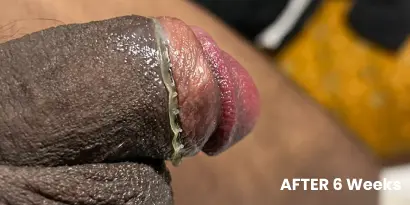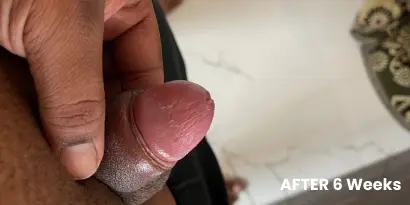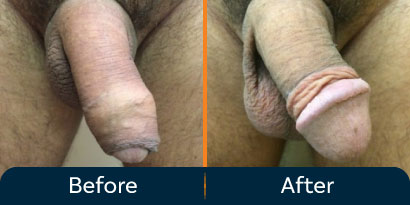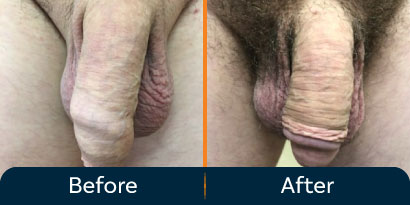
Select City
6 (Six) weeks after circumcision, individuals are most likely to recover from all the painful and discomforting symptoms. The surgical wound should dry and heal and the individual should be able to resume most physical activities. However, in case there are any indications of complications, consulting with an expert urologist is crucial. Contact Pristyn Care and consult with our experienced urologists to know everything about circumcision and the recovery phase thereafter.
6 (Six) weeks after circumcision, individuals are most likely to recover from all the painful and discomforting symptoms. The surgical wound should dry ... Read More




Free Consultation

Free Cab Facility

No-Cost EMI

Support in Insurance Claim

1-day Hospitalization

USFDA-Approved Procedure





Fill details to get actual cost
Choose Your City
It help us to find the best doctors near you.
Ahmedabad
Bangalore
Bhubaneswar
Chandigarh
Chennai
Coimbatore
Delhi
Hyderabad
Indore
Jaipur
Kochi
Kolkata
Kozhikode
Lucknow
Madurai
Mumbai
Nagpur
Patna
Pune
Raipur
Ranchi
Thiruvananthapuram
Vijayawada
Visakhapatnam
Delhi
Gurgaon
Noida
Ahmedabad
Bangalore
After 6 weeks of circumcision, the majority of the healing process for the foreskin is typically complete. Any initial swelling, redness, or discomfort should have significantly subsided by this point. The wound would have largely closed, and any stitches used during the procedure would have dissolved or been removed.
It’s important to continue following post-operative care instructions provided by healthcare professionals to ensure proper healing and minimize the risk of complications. By this time, individuals should generally be able to resume normal activities comfortably. However, it’s always advisable to consult a healthcare provider for any concerns or unusual symptoms during the healing period.

Fill details to get actual cost
Your foreskin is likely to heal after 6 weeks of circumcision. Here are a few indications that your foreskin is healing 6 weeks after circumcision surgery:
It’s important to note that individual healing times may vary, so it’s essential to follow any post-operative care instructions provided by your healthcare provider and to seek medical attention if you experience any signs of infection or complications.
After 6 weeks post-circumcision, individuals usually find it comfortable to resume various activities confidently.
Most everyday activities such as walking, sitting, and standing should pose no discomfort by this time, enabling a return to work or school duties, provided they don’t involve heavy lifting or strenuous physical exertion.
Regular hygiene practices, including bathing and cleaning the genital area, can be resumed, emphasizing gentleness to avoid disrupting the healing process.
While sexual activity may be resumed around this time, caution is necessary, ensuring that any discomfort has significantly subsided, and using sufficient lubrication while avoiding rough or vigorous movements.
Light to moderate exercise, such as walking, jogging, or gentle stretching, can typically be resumed, but strenuous activities that could strain the healing area should still be avoided.
Participation in sports or physical activities may be possible depending on intensity levels and specific instructions provided by healthcare providers, stressing the importance of avoiding activities that could cause trauma to the healing area.
After 6 weeks, patients can usually resume most regular activities, with an emphasis on being gentle with the skin. It’s crucial to remember that individual healing experiences may differ, so listening to one’s body and avoiding overexertion is essential. If any discomfort or complications arise during the resumption of activities, it’s advisable to consult with a healthcare provider for guidance.
Foods to eat after 6 weeks of circumcision
Foods to avoid after 6 weeks of circumcision
6 Weeks after you have undergone circumcision surgery, you are most likely to heal and there would be no major lifestyle restrictions. However, being careful of your actions and habits can prevent any potential complications.
Consult your healthcare provider if you experience any unusual symptoms or concerns.
Remember that everyone’s healing process is different, so listen to your body and take it easy as needed.
Following circumcision, it’s crucial to monitor the healing process closely. While some discomfort is typical, certain symptoms may signal complications requiring medical attention.
Consult a urologist if you experience:
nagireddy
Recommends
Doctor is very good and way of talking and explanation is very nice Thank you pristyn care
Dhananjay Gownder
Recommends
He doesn't make fun of anything ....he treat patient as patient ...he make sures that he jeeps his patient in comfort zone...he is very polite....to be honest he is such a kind hearted person
Harsha
Recommends
Explanation was very well about treatment procedure
Nitin
Recommends
Excellent, quick and seamless experience.
.svg)
.svg)